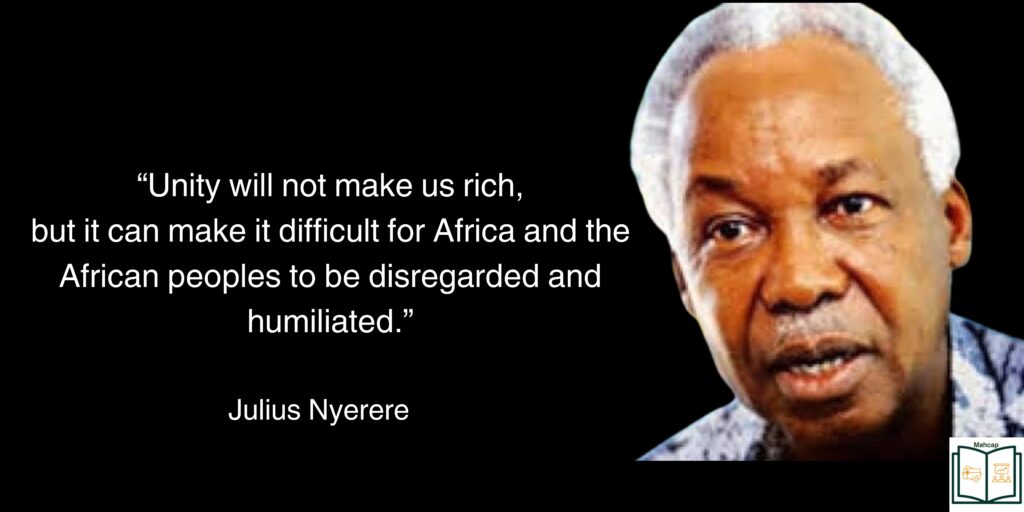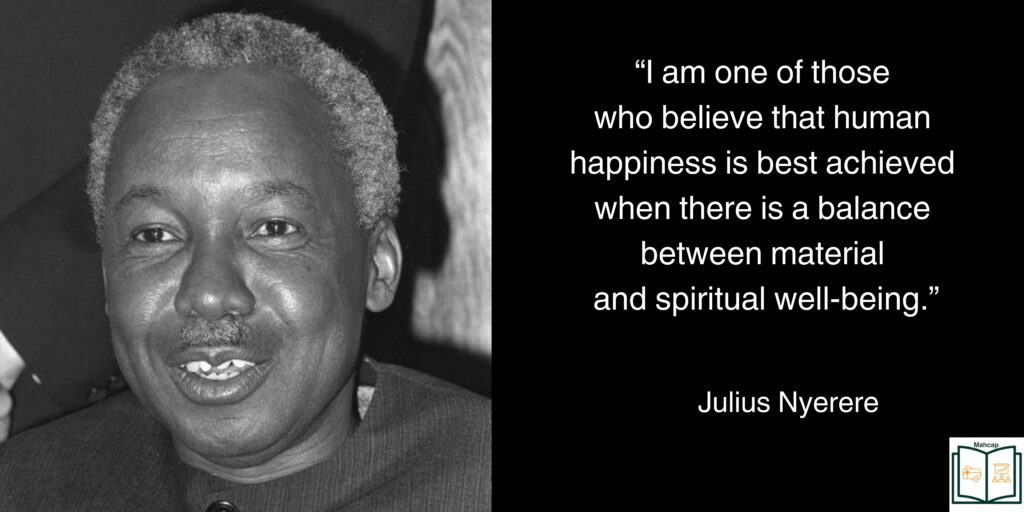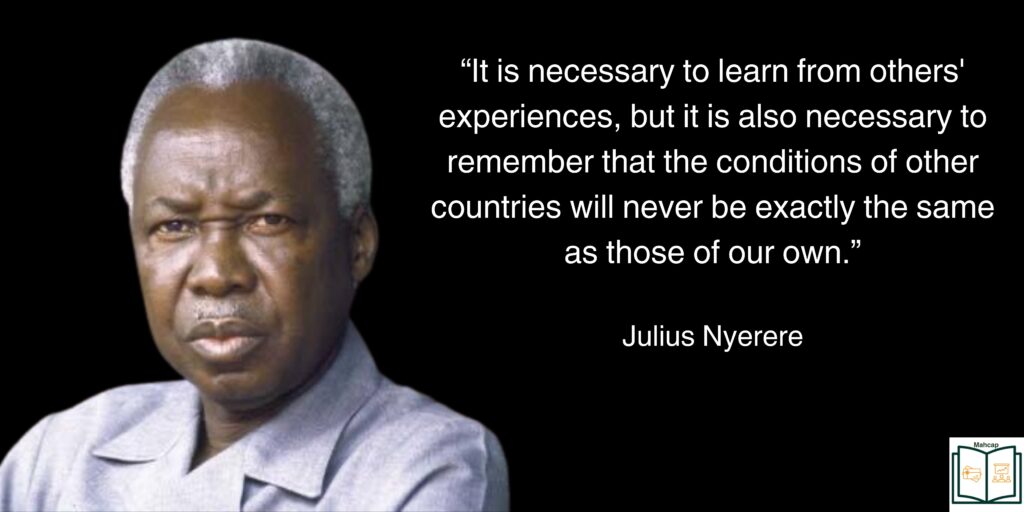Top 9 Quotes by Julius Nyerere
Julius Nyerere, the founding father of Tanzania, was a charismatic leader committed to African socialism called“ujamaa,” which means familyhood in Swahili. He believed principles like democracy and socialism were rooted in African indigenous culture. Nyerere emphasized the significance of integrating African values and culture into development models to avoid the failures related to imposing foreign ideals without considering African history, traditions, and socioeconomic conditions.
Background and Political Life of Julius Nyerere
Julius Nyerere (1922-1999) was born on April 13, 1922, in Butiama, a small village in formerly German East Africa. Nyerere’s political career began when he joined the Tanganyika African National Union (TANU). He rose to prominence as a charismatic and influential leader, advocating for the rights of Africans and fighting against colonial rule. Under Nyerere’s leadership, Tanganyika gained independence from British colonial rule in 1961 and became the first Prime Minister. In 1964, Tanganyika merged with the island of Zanzibar to form the United Republic of Tanzania, and Nyerere served as its first President until 1985.
Nyerere was known for his socialist ideology and commitment to African socialism, termed “ujamaa,” which means familyhood in Swahili. He played a crucial role in establishing the African Union (AU) and actively supported liberation movements in other African countries, including the anti-apartheid struggle in South Africa.
Nyerere passed away on October 14, 1999, leaving behind a lasting legacy as a respected African leader and an advocate for social progress and respect for diversity.
Famous Quotes by Julius Nyerere of Tanzania
Quote 1: Education
“Education is not a way to escape poverty; it is a way of fighting it.”
Nyerere believed that education is not merely a means to attain individual economic prosperity and escape poverty. Instead, he emphasized that education should be viewed as a powerful tool to address the root causes of poverty and bring about long-term change in society. Education provides a pathway for individuals from disadvantaged backgrounds to overcome barriers and achieve upward social mobility. Therefore, by investing in education, societies can nurture human capital, vital for socio-economic development.

Quote 2: Unity
“Unity will not make us rich, but it can make it difficult for Africa and the African peoples to be disregarded and humiliated.”
Nyerere disclose that though unity among Africans may not directly lead to wealth or economic prosperity, it can serve as a powerful force that can prevent Africa and its people from being marginalized, overlooked, or subjected to humiliation on the global stage. Today, despite achieving political independence, external influences and exploitation and internal challenges like corruption, greed, and poor leadership still hinder Africa’s economic progress and sovereignty. Unity among African countries can strengthen our bargaining power and enhance Africa’s collective influence and ability to shape global agendas. By speaking with a united voice, we can participate more effectively in international negotiations, trade agreements, and development initiatives, ensuring our interests are considered and respected. Also, unity must be accompanied by selfless leadership and transformation to enhance prosperity.
Quote 3: Democracy
“Democracy is not a bottle of Coca-Cola which you can import. Democracy should develop according to that particular country.”
The quote highlights that democracy cannot be simply transplanted from one country to another like a commercial product. Instead, democracy should be nurtured and shaped in a manner that is suitable and relevant to the specific circumstances and needs of each country.
Nyerere’s quote suggests that democracy is not a universal, one-size-fits-all concept that can be imposed on any country without regard to its unique historical, cultural, and social context. Democracy should be developed and tailored in a way that reflects the values, traditions, and aspirations of the people in that particular country. It emphasizes the need for a locally appropriate and inclusive approach to democracy-building rather than attempting to impose a particular model of democracy, which can lead to a disconnect between the aspirations of the people and the imposed system.
Quote 4: Indigenization
“We have to build our own road to socialism, using our own bricks.“
Building socialism using “our own bricks” implies the need for innovation, creativity, and adaptation to local circumstances. The quote highlights the importance of tailoring socialist principles to fit each country’s specific needs and aspirations. It recognizes that the path to socialism may differ across nations due to varying historical experiences, cultural identities, and socio-economic conditions. It encourages countries to harness their own resources, talents, and capabilities to shape their economic and social systems, fostering a sense of empowerment and ownership among the people.
Quote 5: African Socialism
“African socialisms, as I have described them, are democratic socialism. A socialism of the African way of life.”
This means that African socialisms or cultures are rooted in democratic principles. It implies that socialism in Africa should reflect and be consistent with African values, traditions, and culture. This recognition of the African way of life ensures that socialist principles and policies resonate with the people to be embraced and sustained over time.

Quote 6: Happiness
“I am one of those who believe that human happiness is best achieved when there is a balance between material and spiritual well-being.”
The quote suggests that a person’s happiness is not solely derived from material possessions, wealth, or achievements. Instead, true happiness is found when individuals experience a harmonious balance between their material desires and their spiritual well-being. It emphasizes the importance of nurturing one’s inner self, values, and connection with something beyond the material world.
In a world driven by consumerism and materialistic pursuits, the quote suggests that finding meaning and contentment in life requires more than material wealth or external circumstances. It is a reminder to seek a balance between material possessions or external achievements and spiritual needs.
Quote 7: Adaptation
“It is necessary to learn from others’ experiences, but it is also necessary to remember that the conditions of other countries will never be exactly the same as those of our own.”
It acknowledges the importance of gaining knowledge and understanding from different approaches, successes, and failures. However, it emphasizes the importance of adapting lessons and experiences to the specific context of one’s own country or life. While it is valuable to learn from others, blindly replicating policies or approaches without considering local or personal conditions can lead to ineffective outcomes.
The quote is a reminder that each country has unique cultural values, traditions, and historical experiences that shape its socio-economic and political landscape. Recognizing these factors is crucial when assessing the transferability of experiences from other countries. The quote underscores the importance of appreciating and respecting diversity, recognizing that what works for one country or person may not necessarily work for another.

Quote 8: Liberty
“The basis of a democratic state is liberty.”
The quote signifies that liberty, or the freedom of individuals to exercise their rights and make choices without undue interference, is fundamental to the establishment and functioning of a democratic state.
Democracy is built upon the idea that people have inherent rights and freedoms that should be respected and upheld by the state. The quote highlights the importance of recognizing and safeguarding the rights of individuals within a democratic state by ensuring that individuals have the freedom to express themselves, pursue their aspirations, and participate in decision-making processes without fear of oppression or undue restriction. Liberty allows for the flourishing of pluralism and diversity within a democratic state. It recognizes that people hold diverse opinions, beliefs, and perspectives and should have the freedom to express and practice them, contributing to a vibrant and inclusive democratic society. In a democratic state, individuals have the liberty to hold their government accountable and participate in decision-making processes, promoting transparency and preventing the concentration of power.
Quote 9: African Socialism and Democracy
“We, in Africa, have no more need of being ‘converted’ to socialism than we have of being ‘taught’ democracy. Both are rooted in our past.”
This implies that socialism and democracy are not foreign concepts imposed on Africa but rather inherent in African history and culture. The quote highlights the compatibility of socialist and democratic principles with African cultural values and traditions. It suggests that Africa has its own historical practices that embody democratic and egalitarian ideals, and these can be drawn upon to shape contemporary systems that reflect African values. The quote encourages us to take ownership of our political, economic, and social systems. It emphasizes the importance of defining and shaping our destinies, ensuring that our socialist and democratic principles are rooted in the realities and aspirations of our societies.
By: Huzeima Mahamadu
Share your views with us, and please subscribe to Mahcap for more tales from Africa.
